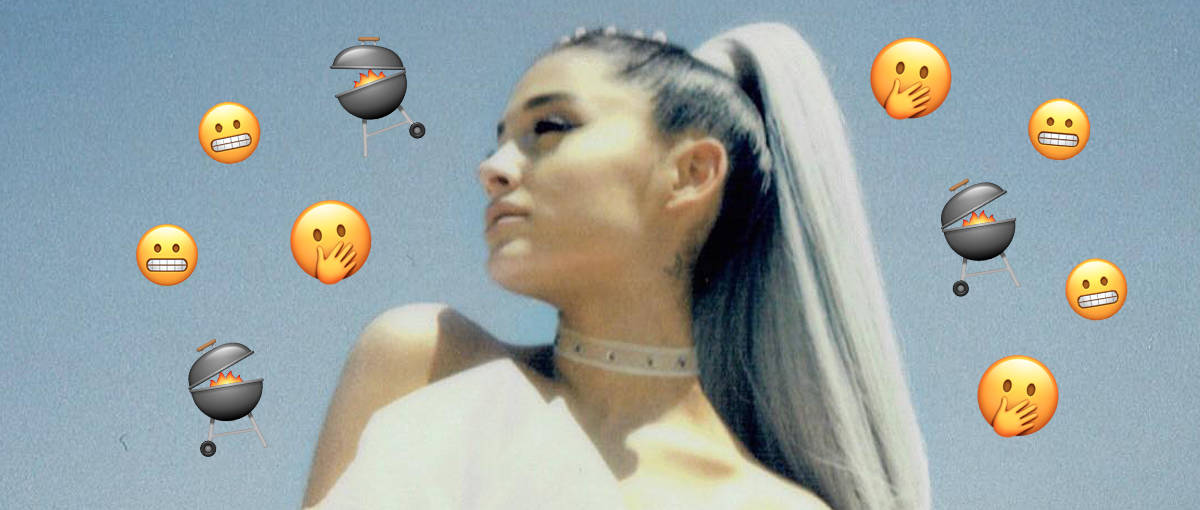Yesterday, January 30th, the world collectively cringed upon realizing that Ariana Grande’s latest palm tattoo actually read “BBQ grill” instead of “7 Rings.” The botched tattoo, written in kanji (a system of Chinese characters used in Japanese writing), quickly went viral. And although Grande owned up to the fact that she messed up, the pressure was clearly on. The singer posted her bad tat adjustment 12 hours ago, but… she actually kind of made it worse.
Grande initially got the tattoo to celebrate the success of her latest single “7 Rings.” In the music video, which is heavily influenced by Japanese culture, “7 Rings” is spelled correctly in kanji: 七つの指輪. However, when Grande went to get her tattoo, she supposedly couldn’t handle the pain.
So, she trimmed 七つの指輪 to 七輪, thinking it was a valid shortcut. Unfortunately, it wasn’t.
Technically, 七 does mean “7,” and 輪 does means “ring,” “wheel,” or “hoop.” But when put together (七輪), the symbols translate to “shichirin,” which is a Japanese-style BBQ grill. Yikes times a thousand.
Grande posted her tattoo on Instagram shortly after getting it done, but removed it soon after the negative/concerned comments started flooding in. However, it was too late. Her official Japanese Twitter page pulled it off Instagram and re-uploaded it onto Twitter.
Here’s what Grande’s “7 Rings/BBQ grill” tattoo looked like as of yesterday:
【Instagramより】
— アリアナ・グランデ JP公式 (@ariana_japan) January 30, 2019
アリアナがまた日本語のタトゥーを追加!今度はなんと漢字で「七輪」😳
「みんなこれは私の手じゃないって思っているみたいだけど、本当に私の手よ🥺」とコメントしています。
「七つの指輪」を略して「七輪」かな🤔💭とても気に入っているよう💍#アリアナ pic.twitter.com/wR55jgu7FU
And here’s what it looks like today. It’s “fixed,” but not necessarily any better than before:

[video_quote pvideo=”dMG2xSIr” video=”dMG2xSIr” text=””]
“Slightly better,” Grande wrote over the image of her updated tat. “Thanks to my tutor for helping me fix and to @kanenavasard for being a legend. and to my doctor for the lidocaine shots (no joke). rip tiny charcoal grill. miss u man. i actually really liked u.”
Sadly, the new version of the BBQ grill tattoo now reads, “Japanese BBQ finger,” according to TMZ. Yup, that character next to the heart means “finger.” What on God’s green earth…
ARIANA GRANDE CHANGED HER TATTOO FROM BEING "bbq grill" TO "Japanese Bbq Finger ♡" HOW DID SHE MESS UP THIS BAD pic.twitter.com/vLupNdNIAJ
— Kay✨ is bi (@yukoandhiro) January 31, 2019
There’s no way the internet will be able to give up on this blunder any time soon. It’s just too nutty.
to be clear i’m a fan of Ariana Grande but her accidentally getting a tattoo in Japanese that says “small charcoal grill” instead of “7 rings” is genuinely one of the funnest things i’ve ever heard
— ellie schnitt (@holy_schnitt) January 30, 2019
You really can’t make this stuff up. Reality is stranger than fiction.
Imagine getting bbq grill tattooed on your palm
— EBEN (@EbenOfficial) January 30, 2019
Grande previously responded to one of those calling her out and said that she wasn’t concerned about the mistake. Because the tattoo is on her palm, it will fade away quickly. But girl… it’s going to be there for a while.
ariana grande welcome to the club of people@who have tattoos they said would disappear and dissolve over time. see u at the laser removal spot
— darcie (@333333333433333) January 30, 2019
Everyone makes mistakes. It’s just that many of us don’t make mistakes so publicly, you know?
And many others are saying that this is a great example of why getting tattoos in one’s non-native language may not be the best idea. Other languages aren’t an aesthetic.
It might look great. But looks clearly aren’t everything.
Honestly, it’s a good point. Note taken.
Furthermore, let this be a lesson to never trust Google Translate. Just ask someone who speaks the language if you really need that foreign language tattoo.
Grande has been trying to save face for two days now. We’re just not sure if it’s working.
Although, some fans are okay with the catastrophe. Or, at least they’re trying to stay supportive.
Met with all the Asians, and our official ruling is that the Ariana Grande tattoo is good.
— Kevin Nguyen (@knguyen) January 30, 2019
And others are on the same page as their pop goddess. As weird as that is…
let the record show that i literally got this tattoo last week @ArianaGrande what kind of minds pic.twitter.com/MFYnrcTDzr
— Shelby (@shelbyeezus) January 30, 2019
Yet, despite the entire ink faux pas, some can’t get away from the fact that Grande’s hand looked totally fake.
ariana grande with her new tattoo. pic.twitter.com/9JQNmPBY91
— 𝘇𝗼𝗲 (@ghostinwilson) January 30, 2019
Pick your battles, internet. This is not what people are upset about.
The next time you decide to get words, characters, or symbols inked, make sure they’re right. Like, really right.

